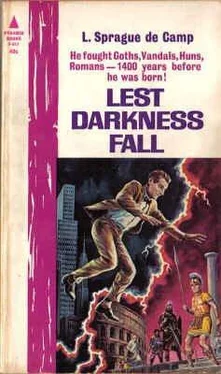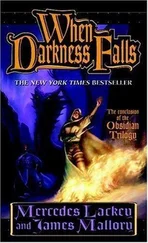L. Camp - Lest Darkness Fall
Здесь есть возможность читать онлайн «L. Camp - Lest Darkness Fall» весь текст электронной книги совершенно бесплатно (целиком полную версию без сокращений). В некоторых случаях можно слушать аудио, скачать через торрент в формате fb2 и присутствует краткое содержание. Год выпуска: 1941, Жанр: Альтернативная история, на английском языке. Описание произведения, (предисловие) а так же отзывы посетителей доступны на портале библиотеки ЛибКат.
- Название:Lest Darkness Fall
- Автор:
- Жанр:
- Год:1941
- ISBN:нет данных
- Рейтинг книги:4 / 5. Голосов: 1
-
Избранное:Добавить в избранное
- Отзывы:
-
Ваша оценка:
- 80
- 1
- 2
- 3
- 4
- 5
Lest Darkness Fall: краткое содержание, описание и аннотация
Предлагаем к чтению аннотацию, описание, краткое содержание или предисловие (зависит от того, что написал сам автор книги «Lest Darkness Fall»). Если вы не нашли необходимую информацию о книге — напишите в комментариях, мы постараемся отыскать её.
Lest Darkness Fall — читать онлайн бесплатно полную книгу (весь текст) целиком
Ниже представлен текст книги, разбитый по страницам. Система сохранения места последней прочитанной страницы, позволяет с удобством читать онлайн бесплатно книгу «Lest Darkness Fall», без необходимости каждый раз заново искать на чём Вы остановились. Поставьте закладку, и сможете в любой момент перейти на страницу, на которой закончили чтение.
Интервал:
Закладка:
"I know as much as you do. I doubt the bribery; at least Aturpad is considered an honorable man. What do you think Wittigis will do?"
"If it were me, I'd hide out for a while and gather my partisans. That would be logical. But my uncle never was very logical. And he hates Thiudahad worse than anything on earth. Especially after Thiudahad's attempt to have him murdered. My guess is that he'll head straight for Ravenna and try to do Thiudahad in personally."
"All right, then, we'll collect some fast cavalry and head that way ourselves."
Padway thought he was pretty well hardened to long-distance riding. But it was all he could do to stand the pace that Urias set. When they reached Ravenna in the early morning he was reeling, red-eyed, in the saddle.
They asked no questions, but galloped straight for the palace. The town seemed normal enough. Most of the citizens were at breakfast. But at the palace the normal guard was not to be seen.
"That looks bad," said Urias. They and their men dismounted, drew their swords, and marched in six abreast. A guard appeared at the head of the stairs. He grabbed at his sword, then recognized Urias and Padway.
"Oh, it's you," he said noncommittally.
"Yes, it's us," replied Padway. "What's up?"
"Well . . . uh . . . you'd better go see for yourselves, noble sirs. Excuse me." And the Goth whisked out of sight.
They tramped on through the empty halls. Doors shut before they came to them, and there was whispering behind them. Padway wondered if they were walking into a trap. He sent back a squad to hold the front door.
At the entrance to the royal apartments they found a clump of guards. A couple of these brought their spears up, but the rest simply stood uncertainly. Padway said calmly, "Stand back, boys," and went in.
"Oh, merciful Christ!" said Urias softly.
There were several people standing around a body on the floor. Padway asked them to stand aside, which they did meekly. The body was that of Wittigis. His tunic was ripped by a dozen sword and spear wounds. The rug under him was sopping.
The chief usher looked amazedly at Padway. "This just happened, my lord. Yet you have come all the way from Rome because of it. How did you know?"
"I have ways," said Padway. "How did it happen?"
"Wittigis was let into the palace by a guard friendly to him. He would have killed our noble king, but he was seen, and other guards hurried to the rescue. The guards killed him," he added unnecessarily. Anybody could see that.
A sound from the corner made Padway look up. There crouched Thiudahad, half dressed. Nobody seemed to be paying much attention. Thiudahad's ashy face peered at Padway.
"Dear me, it's my new prefect, isn't it? Your name is Cassiodorus. But how much younger you look, my dear sir. Ah, me, we'll grow old sometime. Heh-heh. Let's publish a book, my dear Cassiodorus. Heigh-ho, yes, indeed, a lovely new book with purple covers. Heh-heh. We'll serve it for dinner, with pepper and gravy. That's the way to eat a fowl. Yes, three hundred pages at least. By the way, have you seen that rascally general of mine, Wittigis? I heard he was coming to call. Dreadful bore; no scholar at all. Heigh-ho, dear me, I feel like dancing. Do you dance, my dear Wittigis? La-la-la, la-la-la, dum de-um de-um."
Padway told the king's house physician: "Take care of him, and don't let him out. The rest of you, go back to work as if nothing had happened. Somebody take charge of the body. Replace this rug, and make the preparations for a dignified but modest funeral. Urias, maybe you'd better tend to that." Urias was weeping. "Come on, old man, you can do your grieving later. I sympathize, but we've got things to do." He whispered something to him, whereat Urias cheered up.
CHAPTER XV
The members of the Gothic Royal Council appeared at Padway's office with a variety of scowls. They were men of substance and leisure, and did not like being dragged practically away from their breakfast tables, especially by a mere civil functionary.
Padway acquainted them with the circumstances. His news shocked them to temporary silence. He continued: "As you know, my lords, under the unwritten constitution of the Gothic nation, an insane king must be replaced as soon as possible. Permit me to suggest that present circumstances make the replacement of the unfortunate Thiudahad an urgent matter."
Wakkis growled: "That's partly your doing, young man. We could have bought off the Franks—"
"Yes, my lord. I know all that. The trouble is that the Franks won't stay bought, as you very well know. In any event, what's done is done. Neither the Franks nor Justinian have moved against us yet. If we can run the election of a new king off quickly, we shall not be any worse off than we are."
Wakkis replied: "We shall have to call another convention of the electors, I suppose."
Another councilor, Mannfrith, spoke up: "Apparently our young friend is right, much as I hate to take advice from outsiders. When and where shall the convention be?"
There were a lot of uncertain throaty noises from the Goths. Padway said: "If my lords please, I have a suggestion. Our new civil capital is to be at Florence, and what more fitting way of inaugurating it is there than holding our election there?"
There was more growling, but nobody produced a better idea. Padway knew perfectly well that they didn't like following his directions, but that, on the other hand, they were glad to shirk thought and responsibility themselves.
Wakkis said: "We shall have to give time for the messages to go out, and for the electors to reach Florence—"
Just then Urias came in. Padway took him aside and whispered: "What did she say?"
"She says she will."
"When?"
"Oh, in about ten days, I think. It don't look very nice so soon after my uncle's death."
"Never mind that. It's now or never."
Mannfrith asked. "Who shall the candidates be? I'd like to run myself, only my rheumatism has been bothering me so."
Somebody said: "Thiudegiskel will be one. He's Thiudahad's logical successor."
Padway said: "I think you'll be pleased to hear that our esteemed General Urias will be a candidate."
"What?" cried Wakkis. "He's a fine young man, I admit, but he's ineligible. He's not an Amaling."
Padway broke into a triumphant grin. "Not now, my lords, but he will be by the time the election is called." The Goths looked startled. "And, my lords, I hope you'll all give us the pleasure of your company at the wedding."
During the wedding rehearsal, Mathaswentha got Padway aside. She said: "Really, Martinus, you've been most noble about this. I hope you won't grieve too much."
Padway tried his best to look noble. "My dear, your happiness is mine. And if you love this young man, I think you're doing just the right thing."
"I do love him," replied Mathaswentha. "Promise me you won't sit around and mope, but will go out and find some nice girl who is suited to you."
Padway sighed convincingly. "It'll be hard to forget, my dear. But since you ask it, I'll promise. Now, now, don't cry. What will Urias think? You want to make him happy, don't you? There, that's a sensible girl."
The wedding itself was quite a gorgeous affair in a semi-barbaric way. Padway discovered an unsuspected taste for stage management, and introduced a wrinkle he'd seen in pictures of United States Military Academy weddings: that of having Urias' friends make an arch of swords under which the bride and groom walked on their way down the church steps. Padway himself looked as dignified as his moderate stature and nondescript features permitted. Inwardly he was holding on tight to repress a snicker. It had just occurred to him that Urias' long robe looked amazingly like a bathrobe he, Padway, had once owned, except that Padway's robe hadn't had pictures of saints embroidered on it in gold thread.
Читать дальшеИнтервал:
Закладка:
Похожие книги на «Lest Darkness Fall»
Представляем Вашему вниманию похожие книги на «Lest Darkness Fall» списком для выбора. Мы отобрали схожую по названию и смыслу литературу в надежде предоставить читателям больше вариантов отыскать новые, интересные, ещё непрочитанные произведения.
Обсуждение, отзывы о книге «Lest Darkness Fall» и просто собственные мнения читателей. Оставьте ваши комментарии, напишите, что Вы думаете о произведении, его смысле или главных героях. Укажите что конкретно понравилось, а что нет, и почему Вы так считаете.












